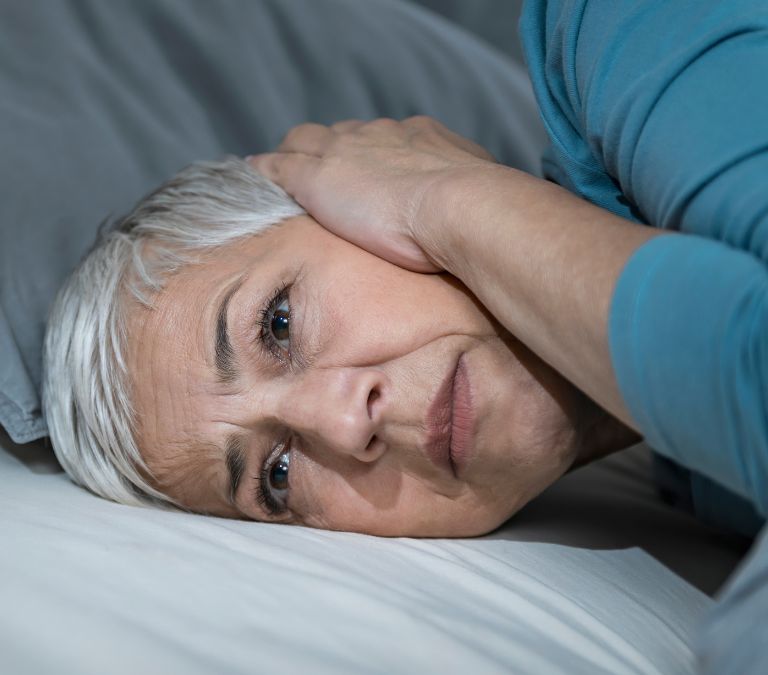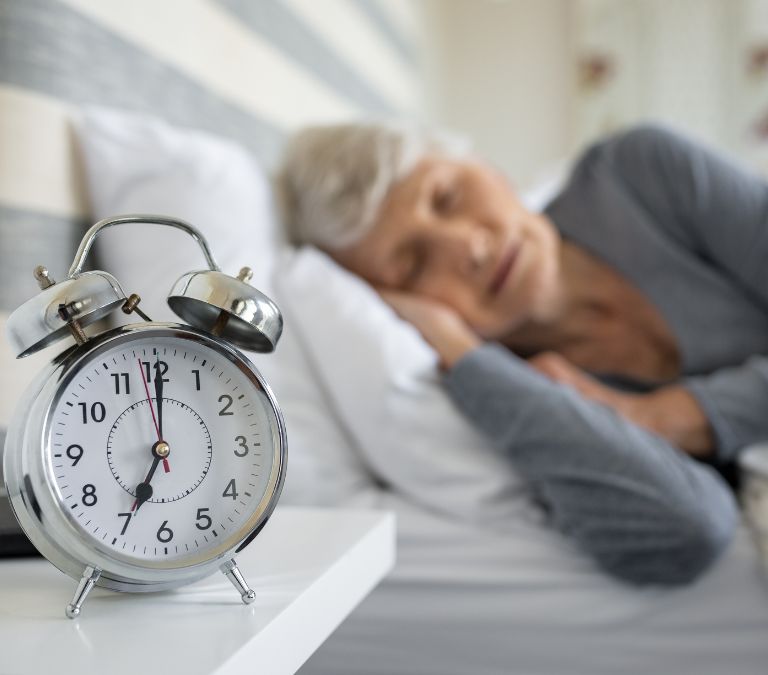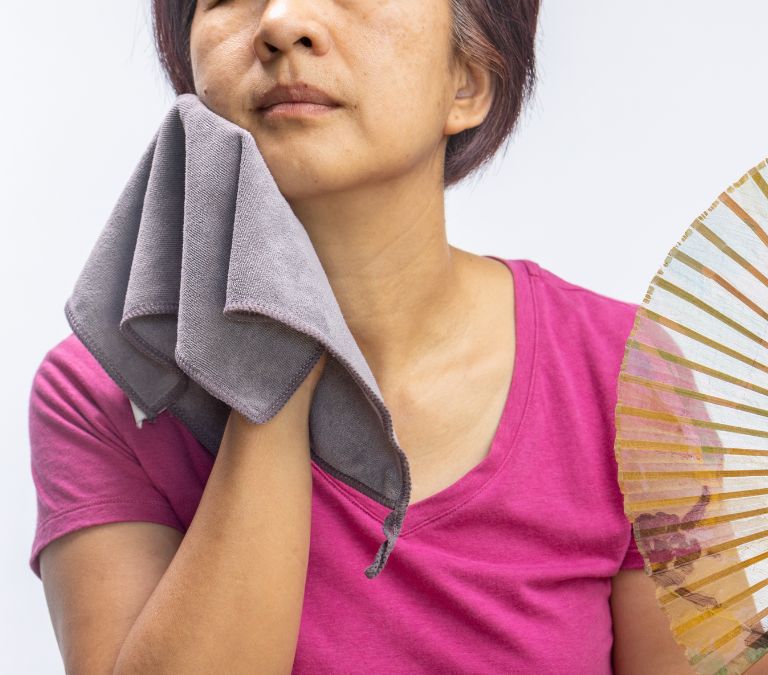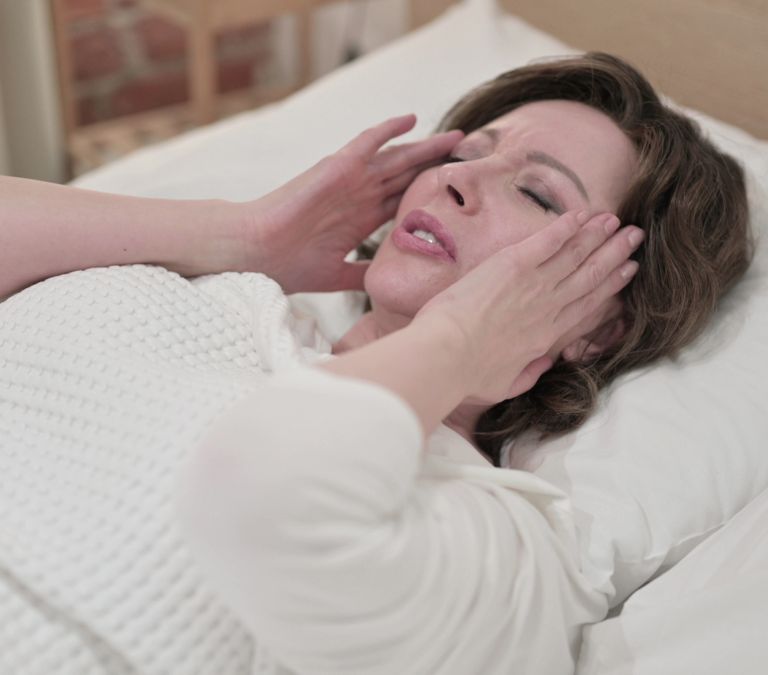Women with lower blood concentrations of estradiol run a higher risk of developing insomnia during menopause. Insomnia in women undergoing menopausal transitions has also been linked to lower levels of melatonin and a greater degree of incidences of other symptoms like nightly hot flashes.
Generally, menopause is caused by a significant decrease in the amount of estrogen and progesterone produced by the ovaries. Accompanying this natural decline in the level of these hormones are some obvious indications, such as hot flashes in the affected. These flashes, which are sudden spreads of warmth around specific spots in the body, are usually a precursor to sudden sweating.
The National Sleep Foundation estimates that about 70% – 80% of women going through menopause experience these sudden flashes of warmth. At times, on their own, the affected women cannot sleep. At other times, insomnia is another distinct hormonal change symptom.
Why Does Menopause Cause Insomnia

Studies indicate that experiencing difficulties in falling asleep during menopause cannot usually be ascribed to one cause. Several factors could be responsible, as discussed below.
A Decline in Hormone Levels
There appears to be a linear correlation between declining hormonal levels (particularly Estrogen) and the incidence of insomnia in menopausal women.
Alone, a progressive reduction in hormonal levels is enough to cause insomnia in women experiencing menopause.
Sudden Flashes of Warmth
Around 70% of women undergoing menopause typically experience sudden onsets of warmth, especially around their faces and necks. Studies have linked this to the body’s adjustment mechanisms for fluctuating hormonal levels.
The onsets of these flashes are not predictable and could be experienced anytime (including during the night) by afflicted people. On their own, the flashes could be discomfiting or cause folks to break out in night sweats, disrupting sleep patterns and ultimately leading to insomnia over time.
Progressive Reduction in Melatonin Levels
Upon falling asleep, the body secretes melatonin which is an important player in helping keep folks asleep.
Normally, humans gradually experience a decrease in levels of melatonin produced by the body with age. While no study points to a clear relationship between declining melatonin levels and menopause, researchers have had meaningful reasons to suspect that there is such a link.
Stages of Menopause
Menopause that happens naturally or in no way due to external influences occurs in three stages:
Perimenopausal Phase: This sets off in most women about 7 to 9 years before natural menopause. Its onset is marked by a notably sharp decrease in the hormonal blood levels of progesterone and estrogen.
Technically, perimenopause extends until the brink of menopause. That means that as soon as you stop ovulating, you’re no longer said to be in your perimenopause. However, some 1 – 2 years before full-blown menopause, should you get inseminated, there is a sizeable chance you may still get pregnant. Typical symptoms of perimenopause include: progressively softening breast tissue, occasional headaches, reduced sex drive, alopecia, etc.
Menopausal Phase: You would have attained menopause if a full year had passed without you getting pregnant. At that stage, your periods would no longer be irregular but would have stopped. The estrogen level in your blood would have declined considerably, subsequently influencing your ovaries to stop producing oocytes. Aside from insomnia, other symptoms of menopause typically include reduced moisture in vaginal walls, more frequent need to urinate, rapid mood fluctuations, and reduced ability of skin walls to retain moisture.
Postmenopausal Phase: Aftermath of the year-long period when you’ve stopped ovulating is the postmenopausal stage. Typically, your hormonal blood levels would have fallen considerably to fractions of what they were in your youth.
Your menopausal symptoms would have eased off considerably in intensity at this stage. However, postmenopausal women are at a greater risk of developing joint diseases and other ailments.
Dealing with Insomnia during Perimenopause

Should you have insomnia, there are some over-the-counter drugs you could consider taking to help you deal with insomnia. Melatonin is one of the drugs that has proved to be very effective in treating insomnia in menopausal and perimenopausal women. Or you could also get a doctor to write you a prescription med. However, it’s important to note that these have no long-lasting effects and should be discontinued once insomnia is fully dealt with.
There are many healthy habits to get familiar with to improve the overall quality of your sleep and eliminate insomnia. Some of them are;
-
Stick to a Sleep Routine: Keeping to certain sleeping times conditions your brain into getting you into bed and out of it automatically. This is considered one of the best ways of dealing with insomnia
-
Consider Never Sleeping During the Day: Napping in the daytime deprives you of quality sleep at nightfall.
-
Keep Away Electronic Gadgets with LCD Screens: LCDs interfere with your sleeping patterns by dividing your mental attention between both.
-
Consider only eating light meals at dinner.
-
Coffees and some tea variants are caffeinated and contain stimulants that might prevent you from sleeping at nightfall.
Other habits to keep in mind when dealing with insomnia are:
-
Keep your room’s temperature settings within controlled, moderate limits. The temperature should be cool but not so cold as to cause discomfort.
-
Get only the best in comfortable bedding materials.
-
Try not to think of work issues during your sleep.
Making these adjustments to your daily routine would doubtless go a long way in easing your Insomnia. However, you should talk to a doctor if you do not experience as much progress as you would like.
Your doctor would be better positioned to know whether or not you should undergo a typical cognitive behavioral therapy to help deal with insomnia. Therapeutic sessions are usually held in groups or on a practitioner-client basis. However, before agreeing to such, ensure your intending psychiatrist has had prior experience dealing with women undergoing menopause.
Menopause Hot Feet at Night
Changes in hormonal levels in women undergoing their menopausal transition cause increased body temperature and occasionally burning feet sensations at night. This has led to insomnia in many menopausal women.
5 Ways Menopausal and Perimenopausal Women Can Cool Down their Hot Feet at Night

Hot feet could very easily cause a huge level of discomfort. Notable among such could be compounding upon your insomnia.
To alleviate the effects of this condition, consider checking the trusted techniques and treatments below:
Reduce Incidences of Blood Congestion in your Feet
Constricting blood flow in your feet would only serve to worsen the condition. An improved blood circulation prevents blood from distributing heat flow properly across a typical human body. Here are some tips to keep in mind to improve circulation:
-
Discard tight footwear in place of more spacious variants
-
Consider rinsing your feet with Epsom salts before going to sleep
-
Take routine walks around the neighborhood.
-
Do not consume alcohol out of proportion.
Take Pain Relievers
Meds such as ibuprofen or aspirin are greatly effective in relieving nerve pain. They, arguably, are by far the best way to relieve burning feet sensation.
Aside from pain relievers, however, also consider taking anticonvulsants and also antidepressants to relieve yourself.
Acupuncture and Acupressure
Both forms of specialized massage serve to reduce constriction of blood flow. The better the circulatory system works, the better it distributes heat evenly across the body.
They are safe practices and carry little to no risks of side effects.
Supplements
Natural or synthesized supplements come in handy in relieving the discomfort associated with hot feet. Some act by elevating blood levels of neurotransmitters, particularly dopamine, which has a calming effect on the body.
Notable examples of supplements to use are:
- Roots and Herbs
- Amino Acids
- Alpha-lipoic Acids
- Vitamins
Remember that it’s always a good idea to chat with your physician before taking supplements, especially if you’re on antidepressants. Both forms of medicine run the possibility of interfering with one another.
Making Some Lifestyle Changes
If you smoke while undergoing menopause, the nicotine from smoking cigarettes would only serve to exacerbate your symptoms. The only viable solution in such a scenario is to stop smoking completely.
Consider also reducing your alcohol consumption rate as that tends to aggravate your symptoms and not just hot feet.
Qualities of the Best Sleeping Pills for Menopause

The US Food and Drug Administration formally describes sleeping pills as medications needed to induce or maintain a state of sleepiness. Sleeping pills are officially categorized into three. The meds typically serve different specific roles in getting people to sleep, hence, the categories.
- Hypnotics or GABA Agonists
- Melatonin Receptor Agonists
- Orexin Receptor Antagonists
Over-the-Counter Sleeping Pills
They tend to be more affordable options compared to prescription meds. Considering that you don’t need a signed order from a doctor to obtain them, they are quite convenient. Most OTCs bank on antihistamines to improve sleep quality.
However, other OTC meds pair acetaminophen and antihistamine to make more powerful sleep inducers. In other drugs, notably NyQuil, it’s not uncommon to find antihistamines bound with alcohol. It might interest you to know that acetaminophen is a pain reliever.
It is worthy of note, however, that you may not feel properly awake for several hours after getting out of bed should you take them. They tend to give takers hangovers. If you use them for a long period, there is a solid chance you will experience severe headaches as a side effect.
Specific Side Effects of Antihistamine-Laced Pills
-
Sore throats
-
Fogginess
-
Constipation
-
Heat Flashes
Prescription Medication
As you would guess, a signed letter from a physician is necessary to obtain these types. There are several variants of this type with peculiar characteristics. They generally are all tagged sedative-hypnotics.
Some variants take a long while to get flushed out of the body, while others have a high risk of addiction. There are a few classes of sedative hypnotics that we’ve covered below.
Benzodiazepine Sedative Hypnotics Sleeping Pills
Observatory studies have established that benzodiazepine-type hypnotics have a higher degree of getting folks dependent compared with non-benzodiazepine types. As such, access to them is restricted and on an as-needed basis. Notable examples of benzodiazepine-type hypnotics on the market for treating insomnia include Estazolam, Triazolam, Temazepam, etc.
Peculiar Drawbacks of benzodiazepine-type meds are listed below.
-
Should you stop taking your meds, insomnia would return. Succinctly, the pills are no permanent fix for the condition.
-
Benzodiazepine types are infamous for their inhibitory effects on the Central Nervous System. There is a high chance you would feel extremely foggy and exhausted the next day.
-
Repetitive usage renders them essentially ineffective. The body continually gets used to the distinct effect and, after some time, makes it no more than a normal bodily process rendering the usage useless.
Non-Benzodiazepine Sedative Hypnotics Sleeping Pills
While these types have the same operational pattern as benzodiazepine-type pills, they don’t quite have the same active components. Generally, Non-Benzodiazepine type hypnotics are considered less risky given that there is a lesser chance of takers getting dependent on their use.
However, they are sold strictly on a doctor’s recommendation. Some peculiar drawbacks to these med types include:
-
Fogginess, Excessive Sweating, Breathing
-
Eventual ineffectualness upon continual usage. Or, in other words, drug tolerance.
Antidepressants
Some antidepressants serve a dual function. Aside from alleviating depression and panic attacks, some also double as treatments for sleep pattern disruptions primarily due to their sedating mode of operation.
For some antidepressants, however, sleep deprivation is a side effect. Not getting as much sleep as required could spell bad for your depression. If you are currently on antidepressants, consider consulting with your physician. There is a chance that your medication might worsen your insomnia.
Guidelines to Follow for Safe Usage of Sleeping Pills
Keep in mind that you should use these pills sparingly. Long-term reliance on meds to stave off insomnia could backfire and increase addiction to the pills. In an ironic twist, there’ve been scenarios where long-term users experienced worsened insomnia upon stopping their use.
That said, there are other inherent dangers to using sleeping pills, such as:
-
Experiencing constipation.
-
Aching Muscles
-
Dry mouth
-
Fogginess
We’ve covered some guidelines worth following in the usage of pills below:
-
Keep alcohol and sleeping pills apart. Alcohol is an enabling medium to heighten the effects of sedating pills. Add that to its inherent ability to muck up sleep patterns, and alcohol is deadly to consume when you’re on sleep meds. Never combine both.
-
Consider only taking sleeping pills if you have up to 8 hours to spare for sleeping. Less than that, and you may never feel properly awake the next day.
-
Never attempt to use beyond the recommended dosage, especially with prescription meds. Defying this could see you suffer from a range of side effects, none of which would be pretty.
-
Avoid repetitive usage. Continually using sleeping pills would only influence your body to build up a tolerance to the drugs and increase your chances of becoming dependent on them.
Remember, irresponsible or excessive usage of pills could cause:
Progressively Increasing Dosage
The more you take drugs, your body will grow accustomed to the dosage. In such cases, to get as much of an effect as you need, you would have to take double the original dosage, which could worsen the side effects you experience.
Total & Complete Dependence
As we briefly touched on earlier, prolonged usage of sleeping meds could get you addicted. Such addictions could mean you find it difficult to sleep without the meds or experience poorer sleep without them.
Withdrawal Side Effects
If you suddenly stop taking your meds after a long time, the typical withdrawal effects (nausea, dizziness, heat flashes) will manifest, making you uncomfortable.
Interference with other Meds
If you currently are on other medication, for instance, on a painkiller med. It would be a good idea to shelve the thought of getting sleeping pills. Both drugs could interfere while trying to achieve their functions, with the result being potentially dangerous.
Cancer and Death
Some infamous studies have shown that folks who took sleeping pills to mitigate their insomnia ran a higher risk of developing cancerous organs and dying earlier than those who did not.
It’s recommended that women suffering from chronic insomnia undergo cognitive behavioral therapy than take pills.
Top 7 Natural Remedies for Sleep Problems in Menopausal Women
Long-term insomnia exposes you to other ailments. For instance, you run a higher risk of getting obese and are more predisposed to coronary diseases should you continually miss your sleep. Giving your body the amount of sleep it needs would also keep your cognitive functionalities in tow.
Some natural remedies worth considering in your quest for a better sleep pattern are as outlined below:
Melatonin
How and when you get to sleep is dictated to your body by the concentration levels of melatonin in your blood. Naturally, the concentration is lower in the mornings than at nightfall. This concentration is why you feel more sleepy at night than in the mornings.
However, artificially synthesized melatonin supplements are now quite popular and could help influence sleep patterns as needed. Should your work routine require that you get to bed in the daytime, or perhaps you need to reduce the amount of time it takes you to get some shut-eye, you would find this very handy.
Worth mentioning is that melatonin should only be used on a short-term basis. While formal studies are yet to be conducted, there appears to be some possible addictive dependence on the drug to get some sleep for long-term takers.
L-Theanine
L-Theanine works by regulating melatonin production, especially in individuals who’ve had their normal melatonin production patterns disrupted for one reason or the other. Melatonin disruptions could be due to naturally declining levels due to old age or inhibitory effects of other drugs in their system.
The supplement is an amino acid and is found in tea leaves. All thanks to its relaxing effect, you get to catch some shut-eye as quickly as you lay on the bed. It also doubles as an anxiety reliever.
L-Theanine also works more distinctively compared with other supplements on our list. It improves the concentration levels of specific neurotransmitters in the brain. The neurotransmitters (serotonin and dopamine) typically influence your mood and the total energy available for your use.
Aside from positively influencing sleep patterns, L-Theanine reduces the instances of anxiety disorders by beating down the production levels of the hormone responsible for the conditions.
Magnesium
90 out of 100 natural bodily processes require Magnesium in some form. The human sleep cycle, alongside cognitive and circulatory processes, are notable dependents on Magnesium.
Magnesium’s notable influence on the sleep cycle can be attributed to its potential to ease tense muscles and boost proper melatonin production. To a less significant effect, the compound also increases concentrations of Gamma-Aminobutyric Acid (GABA). GABA comes into play in calming emotionally tensed people.
Chances are you would find different variants of magnesium supplements on the shelf. For instance, some with magnesium combined with melatonin and others, perhaps, glycine. It’s recommended you consult with your doctor to decide on which would best suit you.
Magnolia Bark
Extracts from the Magnolia Bark as far back as the 19th century by Asians to treat insomnia and relax tension. Controlled studies have established that dosages of the tree extract given to sufferers would reduce their sleep latency and improve the overall time it takes to stay asleep, which ultimately helps in dealing with insomnia
The bioactive compounds in Magnolia reduce the adrenaline levels built up in the body. As adrenaline is linked to stress, the build-up reduction tends to have a sedative effect.
Using Magnolia Bark can relieve panic attacks. It works as efficiently as Diazepam without as many risks of takers getting dependent or experiencing the side effects. The bark extract is especially suitable for women undergoing menopausal transitions as it improves their sleep quality and greatly enhances their moods.
More studies have concluded that using Magnolia could inhibit build-ups of cholesterol. As expected, this tremendously reduces the chances of weight gain in women takers.
Lavender
The short-stalk, the purple-flowered plant, has a wide range of uses that sees it being employed from the skincare industry to medicine.
Crushing the dried Lavender leaves and sniffing them before getting to bed has been noted to greatly improve on troubled sleep patterns of the afflicted.
A study showed that when a group of menopausal women suffering from insomnia was subjected to lavender aromatherapy, their aggregate sleep time improved by well over 50%. As it happened, very few people were able to wake up earlier than previously without the therapy.
Aside from its ability to improve sleep and deal with insomnia, lavender equally doubles as an antidepressant and has been observed to greatly reduce anxiety.
Should you choose to stick with a Lavender, it’s recommended you go the path of aromatherapy and not resort to ingesting it orally.
Glycine
Glycine is one of the twenty essential amino acids needed to maintain bodily functions. Researchers are not sure, but it’s thought that once the melatonin levels fall below a certain threshold, glycine kicks in by lowering body temperature, making it easier to fall asleep.
Unlike lavender, glycine comes either in tablet form or as a powder that can be dissolved in water. Ergo, it’s greatly suitable for oral ingestion.
A 2008 study on a group of volunteers concluded that glycine reduced fogginess and boosted cognitive functions during the day. The volunteers had previously been asked to go for three nights without sleeping.
Considering that amino acids are building blocks for proteins, it probably would come as no surprise to know that you could also get glycine from consuming rich protein sources such as:
-
Legumes (Beans notably)
-
Animal Sources (Meat, Eggs, Fish)
Passion Flower
How effective this plant is in improving sleep quality and reducing latency depends on which form it consumes. Doctors have confirmed the potency of the plant using animals.
A 2018 study demonstrated how participants who were placed on the supplement for two weeks fared. Most of the partakers declared great improvements in the overall time it took them to keep asleep and the sleep latency. Sleep latency refers to how long it took for them to fall asleep after lying on the bed.
Regarding ingestion methods, one can take the water-diluted form of the ground extract and another to apply the gel form on the skin.
Final Thoughts
Inability to fall or keep asleep, also Insomnia, is a side symptom women undergoing their menopausal transitions face at one point or another. Its onset can be attributed to the progressive decline in hormonal levels.
Insomnia is especially more complicated in women who’ve attained menopause, considering the twin fact of their declining melatonin levels.
There are some routines worth adopting by women to improve the quality of their sleep and deal with insomnia. Should those be inadequate, consider purchasing prescribed medication or checking with a physician for a more appropriate checkup to work things out.







